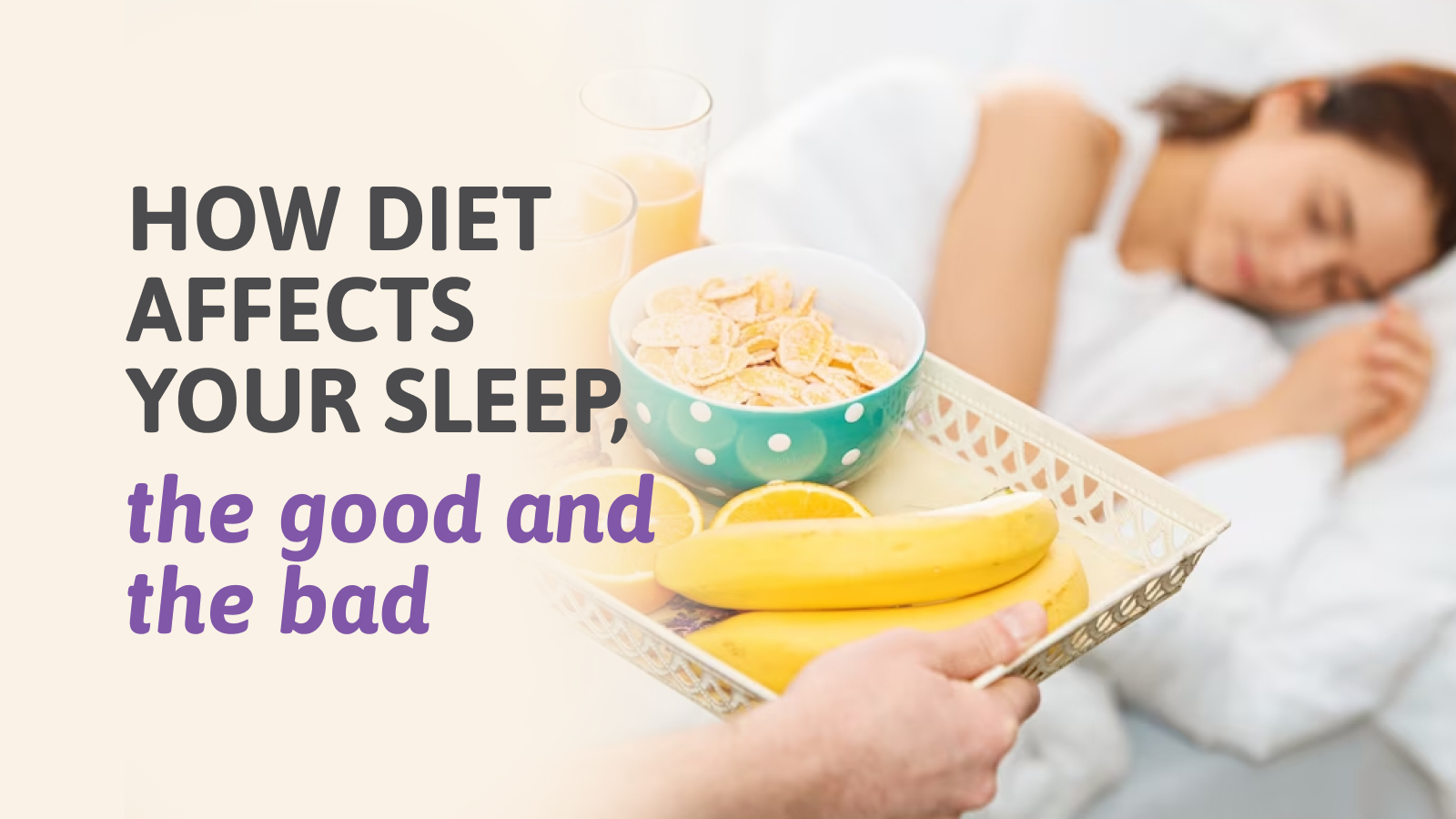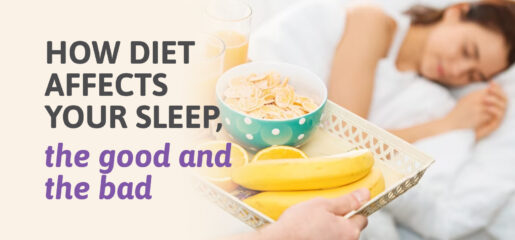
It may seem obvious that food can affect your sleep. Afterall, most of us have eaten something that didn’t sit well and caused us to have a bad night’s sleep. However, what many don’t realize is that food can have a profound impact on how well, or how poorly, you sleep (aside from occasional upset stomachs).
In this article, we’ll take a look at how the foods we eat can affect our sleep, as well as some other ways to make sure you get the most out of nightly sleep.
Certain Foods Can Improve Your Sleep
While more research about how certain foods (and what’s in them) can impact your sleep, there’s already some interesting research in certain nutrients that can improve your sleep.
Foods with Tryptophan
Tryptophan is an essential amino acid that plays a crucial role in the synthesis and maintenance of certain proteins, enzymes, and neurotransmitters in the body. Since it’s “essential,” that means that your body is unable to make it, so you have to get it from the food you eat.
Why do foods high in tryptophan have the ability to help you sleep? The reason is because tryptophan is responsible for creating serotonin, which is another neurotransmitter in your body. Serotonin becomes melatonin ( a hormone your body produces that plays a key role in the human wake-sleep cycle.) when your eyes are no longer exposed to light.
Research suggest that eating foods with tryptophan can help improve your sleep, and some of those foods include:
- Milk
- Fish
- Eggs
- Cheese
Foods with Serotonin
Eating foods with serotonin may also help you sleep, and for the same reasons that eating foods with tryptophan do. When it becomes dark, that extra serotonin will become melatonin, which may be able to help you sleep.
Foods that naturally have serotonin include
- Poultry
- Salmon
- Milk
- Soy products
- Certain seeds and nuts
Foods with Melatonin
As you might expect, foods with melatonin may be able to help improve sleep. This is especially true of tart cherry juice, which has been shown in other studies to help older adults who struggle with insomnia to sleep.
The foods that contain melatonin may be best to consume closer when you plan on falling asleep. Some foods to consider include:
- Tart Cherries
- Milk
- Nuts
Foods with Zinc
Finally, foods high in zinc may help with zinc, because zinc plays a role in helping convert tryptophan to serotonin, and serotonin to melatonin. Some research has suggested that zinc can have a direct impact on improving sleep, so making sure you keep zinc levels normal might be a way to help get better, more consistent sleep.
Some foods high in zinc include:
- Seafood, like oysters
- Red meat
- Poultry
Consider Dietary Supplements for these Nutrients
If you struggle to get these nutrients from the food you eat, taking them as dietary supplements can help. This is particularly true of zinc, which research shows that taking zinc supplements may have a positive impact on your sleep.
If you choose to try taking melatonin supplements, just be sure to take them at night, as you may feel drowsy quickly after taking them.
Lacking Certain Foods Can Hurt Your Sleep
Not only can eating the right kinds of food help you sleep, but missing out on nutrients can have a negative impact on your sleep. Specifically, a diet low in tryptophan can hurt your ability to sleep well. Most people know eating nutrient-dense foods is important, but making sure to do so can directly affect how well, or how poorly, you sleep.
When You Eat Can Impact Your Sleep
Not only should you consider what you eat, you need to consider when you eat, too. Eating at odd times can affect your circadian rhythm, and research suggests that eating at regular, normal intervals (especially breakfast) can help set your circadian rhythm to a normal pattern.
So when should you eat? Typically, you should stop eating three hours before you plan on trying to sleep. You should avoid eating foods that may upset your stomach, and if you do need to eat closer to bedtime, consider smaller portions of light foods, like vegetables.
Lots of Caffeine Can Negatively Impact Your Sleep
Drinking too much caffeine, or drinking caffeine too late in the day, can hurt your ability to sleep well. Caffeine is a stimulant, which can make it hard to relax and calm yourself at night in order to fall asleep. Research suggests that you should stop drinking caffeine at least six hours before you plan to sleep, and some may need to consider only having caffeine earlier in the morning.
Alcohol Can Negatively Impact Your Sleep
While alcohol is often used as a tool to help fall asleep, it actually will end up making your sleep quality worse. A study examining men and alcohol consumption found that drinking a lot of alcohol before sleep makes it harder to stay asleep and lowers the overall quality of that night’s sleep.
That study even suggested that alcohol before bed increases the chances of snoring, which can be a sign of issues with breathing (and will definitely impact the sleep of your partner). Try to avoid drinking right before sleep, and if you are drinking so you can help falling asleep, consider some other solutions we list below.
Other Ways to Improve Sleep
If you’re looking at ways to make it easier to fall asleep or stay asleep, here are a few other tips to consider:
Take Melatonin Supplements at Night
We mentioned this earlier in the article, but we’ll mention it here again. Taking melatonin as a supplement at night may help you fall asleep and stay asleep. It doesn’t work for everyone (and some don’t like vivid dreams it can cause), but since the side-effects are mild to non-existent, it may be worth trying.
Exercise Regularly
Regular exercise has research-backed evidence that it can help improve your sleep. Vigorous exercise tends to yield better results, but if you currently don’t get much physical activity and you struggle to sleep, consider adding exercise into your weekly routine.
Try CBD
CBD, short for cannabidiol, is a cannabinoid that is naturally occurring in hemp. CBD is legal in most countries, and recent research has promising results showing how CBD might be able to help improve your sleep. This is especially true if you have struggled to sleep due to chronic pain or anxiety, both of which research suggests can be improved by regular CBD use.
If you decide you want to try CBD to help with sleep, make sure to talk to your doctor first, since CBD can interact with certain kinds of prescription medications.
Diet and Sleep: Summary
Diet can have an enormous impact on your sleep. You should make sure to eat nutrient dense foods, especially those that contain:
- Tryptophan
- Serotonin
- Melatonin
- Zinc
You can also consider following other tips in addition to a good diet to improve your sleep, like not eating late, avoiding caffeine and alcohol late, getting regular exercise, and trying CBD.
If you’re interested in trying CBD to help improve your sleep and have questions, reach out to us! Our experts would love to answer any questions you have about CBD and how to use it for sleep.
If you don’t have questions but are ready to shop, take a look at our online store. If you have an idea of what may be preventing your sleep, take a look at some of our custom CBD formulas (like our Sleep formula, specifically designed to help you fall asleep and stay asleep).

